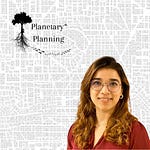This episode is a conversation with António Ferreira, multidisciplinary researcher and writer on themes as varied and interconnected as degrowth/post-growth, urban and regional planning, mobilities and transport, critical innovation and digitalisation studies, and more. António works as principal researcher at CITTA, Centre for Territory, Transports and Environment, at the University of Porto.
In this episode, we focus on cyborgs, a topic António dives into in depth in one of the chapters of his recent book, Mobilities in a Turbulent Era. We discuss what cyborgs are, the extent to which they are more-than-human, less-than-human, or perhaps something else entirely. António gives us many examples of the cyborgs already within and among us, as well as the possibilities that could emerge in relation to cyborgs in future. We discuss kaleidoskopic ways of looking at the world (and problems within in) - as an alternative to feeling stuck in dilemma’s or always applying the same go-to “solution”. António applies some of this thinking when we discuss digitalisation more broadly, and how seeking digital solutions to any problem has become the go-to option that - by losing critical reflection about the why and how underlying it - has many hidden downsides. Of course, we also touch on the materiality of the cyborg and the digital, that brings another dimension to the critique of the human-nature binary that has been previously discussed in this podcast. Finally, António shares his take-aways from all this for Planetary Futures and Planetary Planning based on this conversation:
Take-aways for planners (and others), by António Ferreira:
Humans in general and Planners in particular should seek more maturity in their decision structures and actions.
Let’s not “throw computers at the problem” assuming that “something should come out of it, right?” - think a bit further and more critically (and creatively?) about this
Protect children from excessive computer exposure, digital exposure and ciborgisation, before they are capable of making their own choices in this matter
All the above can help to have a planning education that is not about a ciborgisation process only because we cannot imagine an alternative
Less computers, less digitalisation, and more humanity in adressing complexity
References mentioned during the episode:
Ferreira, A. (2024) Mobilities in a Turbulent Era. Edward Elgar.
Hine, D. (2023) At Work in the Ruins. Finding Our Place in the Time of Climate Crises and Other Emergencies. Chelsea Green.
Sennett, R. (1970) The Uses of Disorder. Personal Identity and City Life. Verso Books.
Daniel Schmachtenberger on the Multi-Polar Trap (see for example, here)
The Karate Kid 1984 (Film)
RoboCop 1987 (Film)












Share this post